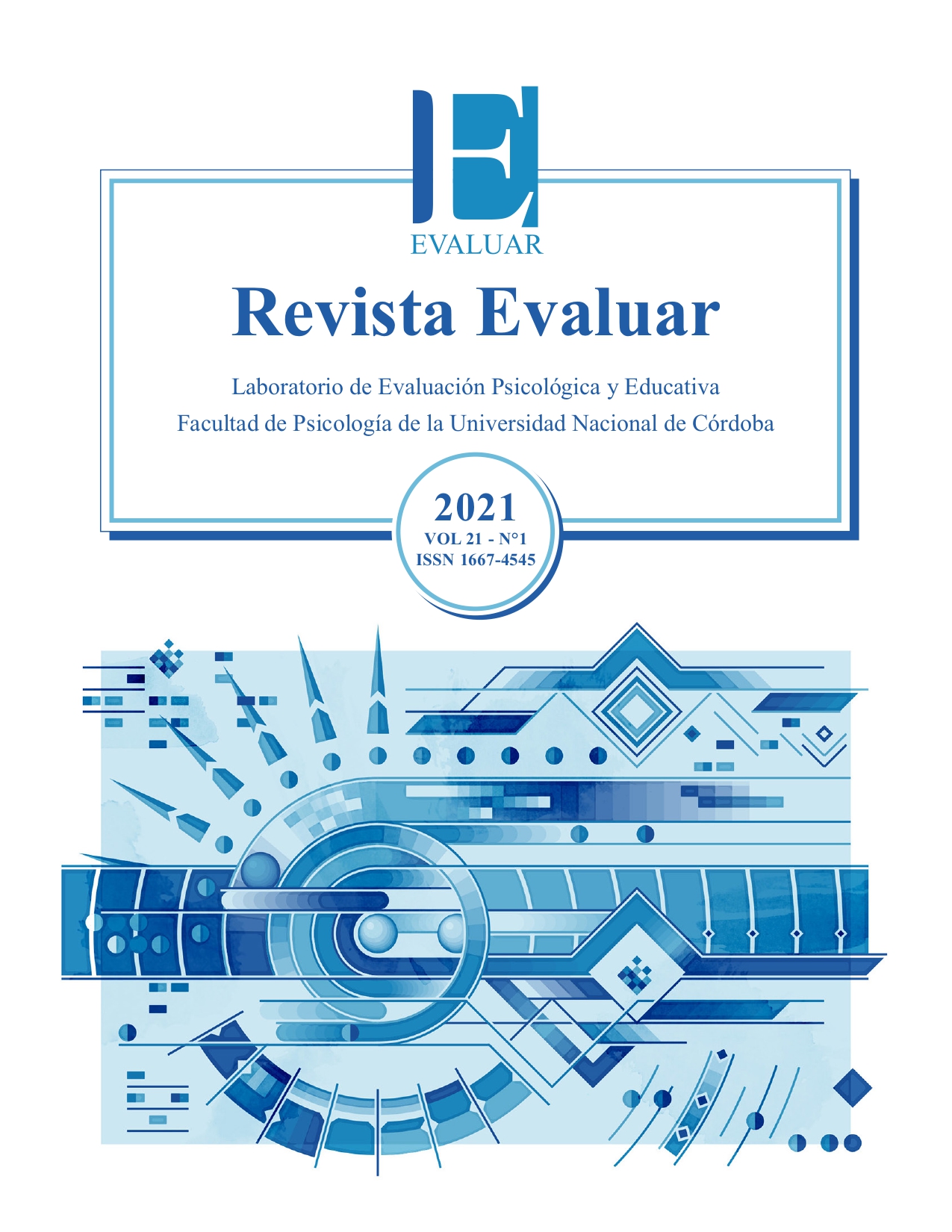Venezuelan Financial Behavior: A Scale for Economic Adversity Contexts
DOI:
https://doi.org/10.35670/1667-4545.v21.n1.32829Keywords:
financial behaviour, classical test theory, savings, debt management, economic psychologyAbstract
Financial conduct is understood as any action that involves the use of money. These behaviors may vary depending on the economic reality of the countries, being the territories with financial difficulties those that pose greatest challenges in their measurement. The objective was to develop a financial behavior scale and analyze its psychometric properties. The items were prepared with the collaboration of expert judges and the dimensions of financial behavior were: (a) savings behavior, (b) debt management and (c) money management. The sample consisted of 780 participants (59.74% female) from Caracas aged between 18 and 70 years, from different occupational sectors. An adequate internal consistency of the instrument was obtained
in most of the factors. In addition, evidence of external validity to the test was found. Differences in the three dimensions depending on sociodemographic variables are shown in the study.
Downloads
References
Barbar, R., Benasayag, S., & Salomón, L. (2019, enero). Nuevo encaje bancario: ¿Cuáles son las implicaciones? PRODAVINCI. Recuperado de https://prodavinci.com
De Minzi, M. (2008). Nuevas tendencias en psicometría. Revista Evaluar, 8(1), 1-19. doi: 10.35670/1667-4545.v8.n1.501
Dew, J., & Xiao, J. J. (2011). The financial management behavior scale: Development and validation. Journal of Financial Counseling and Planning, 22(1), 43-59. Recuperado de https://digitalcommons.uri.edu
España, L., & Ponce, M. (2018). Evolución de la pobreza. IIES/UCAB. Recuperado de https://www.ucab.edu.ve
Fernández, A., Pérez, E., Alderete, A. M., Richaud, M. C., & Liporace, M. F. (2010). ¿Construir o adaptar tests psicológicos? Diferentes respuestas a una cuestión controvertida. Revista Evaluar, 10(1), 60-74. doi: 10.35670/1667-4545.v10.n1.459
Garðarsdóttir, R. B., & Dittmar, H. (2012). The relationship of materialism to debt and financial well-being: The case of Iceland’s perceived prosperity. Journal of Economic Psychology, 33(3), 471-481. doi: 10.1016/j.joep.2011.12.00
Gärling, T., Kirchler, E., Lewis, A., & Van Raaij, F. (2009). Psychology, financial decision making, and financial crises. Psychological Science in the Public Interest, 10(1), 1-47. doi: 10.1177/1529100610378438
Gudmunson, C. G., & Danes, S. M. (2011). Family financial socialization: Theory and critical review. Journal of Family and Economic Issues, 32(4), 644-667. doi: 10.1007/s10834-011-9275-y
Gudmunson, C., Ray, S. K., & Xiao, J. J. (2016). Financial socialization. En J. J. Xiao (Ed.), Handbook of Consumer Finance Research (pp. 61-72). Cham: Springer. doi: 10.1007/978-3-319-28887-1_5
Hair, J. F., Black, W. C., Babin, B. J., & Anderson, R. E. (2019). Multivariate Data Analysis. Estados Unidos: Cengage.
IBM Corp. (2013). IBM. SPSS Statistics for Windows (Version 22.0). [Software de cómputo]. Armonk, NY: IBM Corp.
Kahneman, D. (2013). Pensar rápido, pensar despacio. Estados Unidos: Debolsillo.
Kerlinger, F., & Lee, H. (2002). Investigación del comportamiento: Métodos de Investigación en Ciencias Sociales. (4a ed.). Ciudad de México, México: McGraw Hill.
Kirchler, E., & Hoelzle, E. (2018). Economic Psychology: An Introduction. Cambridge University Press: United Kingdom.
Ksendzova, M., Donnelly, G. E., & Howell, R. T. (2017). A brief money management scale and its associations with personality, financial health, and hypothetical debt repayment. Journal of Financial Counseling and Planning, 28(1), 62-75. doi: 10.1891/1052-3073.28.1.62
Laibson, D., & List, J. A. (2015). Principles of (behavioral) economics. American Economic Review, 105(5), 385-390. doi: 10.1257/aer.p20151047
Lloret-Segura, S., Ferreres-Traver, A., Hernández-Baeza, A., & Tomás-Marco, I. (2014). El análisis factorial exploratorio de los ítems: Una guía práctica, revisada y actualizada. Anales de Psicología, 30(3), 1151-1169. doi: 10.6018/analesps.30.3.199361
Lorenzo-Seva, U., & Ferrando, P. (2011). FACTOR (Versión 8.02). [Software de cómputo]. Recuperado de http://psico.fcep.urv.es/utilitats/factor/index.html
Magnusson, D. (1972). Teoría de los test. Ciudad de México, México: Trillas.
Manzini, J. L. (2000). Declaración de Helsinki: Principios éticos para la investigación médica sobre sujetos humanos. Acta Bioethica, 6(2). doi:10.4067/S1726-569X2000000200010
Mcnair, S., & Crozier, W. R. (2017). Assessing psychological dispositions and states that can influence economic behaviour. En R. Ranyard (Ed.), Economic Psychology (pp. 69-87). Hoboken: Wiley-Blackwell. doi: 10.1002/9781118926352.ch5
Montero, I., & León, O. G. (2007). A guide for naming research studies in Psychology. International Journal of Clinical and Health Psychology, 7(3), 847-862. Recuperado de https://www.redalyc.org
Muñiz, J., & Fonseca-Pedrero, E. (2019). Diez pasos para la construcción de un test. Psicothema, 31(1), 7-16. doi: 10.7334/psicothema2018.291
Olmo, D. G. (18 de noviembre de 2019). Dolarización en Venezuela: Cómo Nicolás Maduro cambió de opinión sobre el dólar y su papel en la economía. BBC News. Recuperado de https://www.bbc.com/mundo/noticias-america-latina-50466818
Ortega, V., & Vargas, J. C. R. (2004). Escala de hábitos y conductas de consumo: Evidencias sobre dimensionalidad. International Journal of Clinical and Health Psychology, 4(1), 121-136. Recuperado de https://www.redalyc.org
Pérez, E., & Olaz, F. (2008). Validez. En S. Tornimbeni, E. Pérez & F. Olaz (Eds.), Introducción a la Psicometría (pp.101-136). Buenos Aires, Argentina: Paidós.
Perry, V. G., & Morris, M. D. (2005). Who is in control? The role of self-perception, knowledge, and income in explaining consumer financial behavior. Journal of Consumer Affairs, 39(2), 299-313. doi: 10.1111/j.1745-6606.2005.00016.x
Porter, N. M., & Garman, E. T. (1993). Testing a conceptual model of financial well-being. Financial Counseling and Planning, 4, 135-165. doi: 10.1.1.379.6832
Prieto, G., & Muñiz, J. (2000). Un modelo para evaluar la calidad de los test utilizados en España. Papeles del Psicólogo, 77, 65-75. Recuperado de https://www.redalyc.org
Ranyard, R., & De Mello-Ferreira, V. R. (2017). Introduction to economic psychology: The science of economic mental life and behaviour. En R. Ranyard (Ed.), Economic Psychology (pp. 1-18). doi: 10.1002/9781118926352.ch1
Sardi, G., Angelucci, L., Martins, A., & Peña, G. (2020). Representaciones de la economía como fenómeno psicosocial. En C. Peña (Ed.). Miradas a la Venezuela del siglo XXI (pp. 377-406). Caracas, Venezuela: Instituto de Investigaciones Económicas y Sociales: “Dr. Rodolfo Quintero”.
Veiga, R. T., Avelar, C., Moura, L. R. C., & Higuchi, A. K. (2019). Validation of scales to research the personal financial management. Revista Brasilera de Gestão de Negócios, São Paulo, 21(2), 332-348. doi: 10.7819/rbgn.v21i2.3976
UCAB. (2020, 13 de julio). UCAB ENCOVI | 2019-2020. Recuperado de https://www.youtube.com/watch?reload=9&v=ph0QyIaWJ_k&feature=youtu.be
Van Raaij, W. F. (1981). Economic psychology. Journal of Economic Psychology, 1(1), 1-24. doi: 10.1016/0167-4870(81)90002-7
Van Raaij, W. F. (2016). Understanding consumer financial behavior money management in an age of financial illiteracy. doi: 10.1057/9781137544254
VandenBos, G. R. (2015). APA Dictionary of Psychology (2a ed.). USA: American Psychological Association. doi: 10.1037/14646-000
Xiao, J. J. (2008). Appliying behavior theories to financial behavior. En J. J. Xiao (Ed.), Handbook of Consumer Finance Research (pp. 69-81). New York, USA: Springer. doi: 10.1007/978-0-387-75734-6_5
Downloads
Published
How to Cite
Issue
Section
License
Copyright (c) 2021 Antonio Martins, Luis Rodríguez

This work is licensed under a Creative Commons Attribution 4.0 International License.
Revista Evaluar aplica la Licencia Internacional de Atribuciones Comunes Creativas (Creative Commons Attribution License, CCAL). Bajo esta licencia, los autores retienen la propiedad de copyright de los artículos pero permiten que, sin que medie permiso de autor o editor, cualquier persona descargue y distribuya los artículos publicados en Evaluar. La única condición es que siempre y en todos los casos se cite a los autores y a la fuente original de publicación (i.e. Evaluar). El envío de artículos a Evaluar y la lectura de los mismos es totalmente gratuito.




_(3).jpg)



.jpg)



